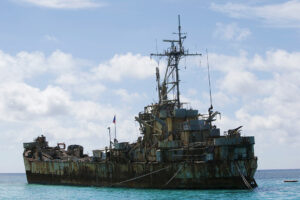PHILIPPINE and South Korean envoys have vowed to pursue deeper maritime ties and come up with plans against illegal and unregulated fishing and push marine environment protection and maritime security, according to the Philippine Department of Foreign Affairs (DFA).
In a statement on Thursday, the DFA said Philippine Ambassador to South Korea Ma. Theresa-de Vega and other Philippine officials met with Association of Southeast Asian Nations (ASEAN) Director General Kim Dong-Bae on Nov. 11 in Incheon to discuss port infrastructure cooperation and other maritime issues.
“The Philippines and South Korea affirmed the importance of maintaining peace, stability and security in the region, including in the South China Sea,” it said. “The Philippines called for the exercise of self-restraint and pursuing peaceful means to manage differences.”
Both sides also agreed to hold next year’s maritime dialogue next year in Manila.
“Both countries reaffirmed their dedication to a future-oriented strategic partnership that will enhance maritime security, promote sustainable economic growth and protect the marine environment for present and future generations,” the DFA said.
This comes amid growing tensions between the Philippines and China over disputed areas of the South China Sea, including Scarborough Shoal, one of Asia’s most contested features.
The DFA on Wednesday summoned Chinese Ambassador Huang Xilian to deliver the Philippines’ protest over China’s drawing of baselines around the shoal on Nov. 10.
China claims almost the entire South China Sea, a conduit for more than $3 trillion of annual ship-borne commerce. The Permanent Court of Arbitration in 2016 said China’s claims had no legal basis, a ruling Beijing rejects.
The meeting was the third maritime dialogue between Seoul and Manila where the parties discussed the transfer of decommissioned Korean ships to the Philippines.
Last month, South Korean President Yoon Suk Yeol met with Philippine President Ferdinand R. Marcos, Jr. and vowed to pursue deeper cooperation between their coast guards.
Both leaders agreed to uphold an international rules-based order, including on safety of navigation in the South China Sea, with Seoul vowing to take part in the modernization program of the Philippine military.
The US and Philippine coast guards earlier this month held a technical workshop on maritime law in Bataan that also had participants from maritime law enforcement agencies from Indonesia, Malaysia, Thailand and Vietnam.
The Philippine Coast Guard has borne the brunt of Chinese intrusions into the Philippines’ exclusive economic zone in the South China Sea.
The Philippines and China have repeatedly clashed in the waterway, accusing each other of aggressive behavior involving their ships and of damaging the marine environment.
US Defense Secretary Lloyd Austin III is set to visit the Philippines next week and to meet with his Philippine counterpart to explore deeper security ties to ensure peace in the Indo-Pacific region.
Last year, the Philippines gave the US access to four more military bases under their 2015 Enhanced Defense Cooperation Agreement.
Philippine Defense Secretary Gilberto Eduardo Gerardo “Gibo” C. Teodoro, Jr. on Tuesday said China is putting greater pressure on the Philippines to cede its sovereign rights in the South China Sea.
Meanwhile, Mr. Marcos said his government remained firm about the enforcement of two laws that affirmed the country’s rights over its maritime zones and exclusive economic zone in the South China Sea despite Chinese objections.
“Of course, we do not agree with their definition of sovereign territory,” he told reporters. “So our situation has not changed. We have the same position.”
Days after the signing of the Philippine Maritime Zones bill and Philippine Archipelagic Sea Lanes bill last week, China released geographic coordinates around Scarborough Shoal, which it has effectively controlled since 2012. China said the move was a “natural step” in its maritime management.
Scarborough has been a source of tension in the South China Sea, with Chinese coast guard vessels backed by maritime militia ships firing water cannons at Philippine vessels and preventing Filipino fishermen’s access to the shoal.
A 2016 arbitral ruling that voided China’s expansive claims in the South China Sea said the shoal is a traditional fishing ground for Filipino, Chinese and Vietnamese fishermen. — John Victor D. Ordoñez and Kyle Aristophere T. Atienza

